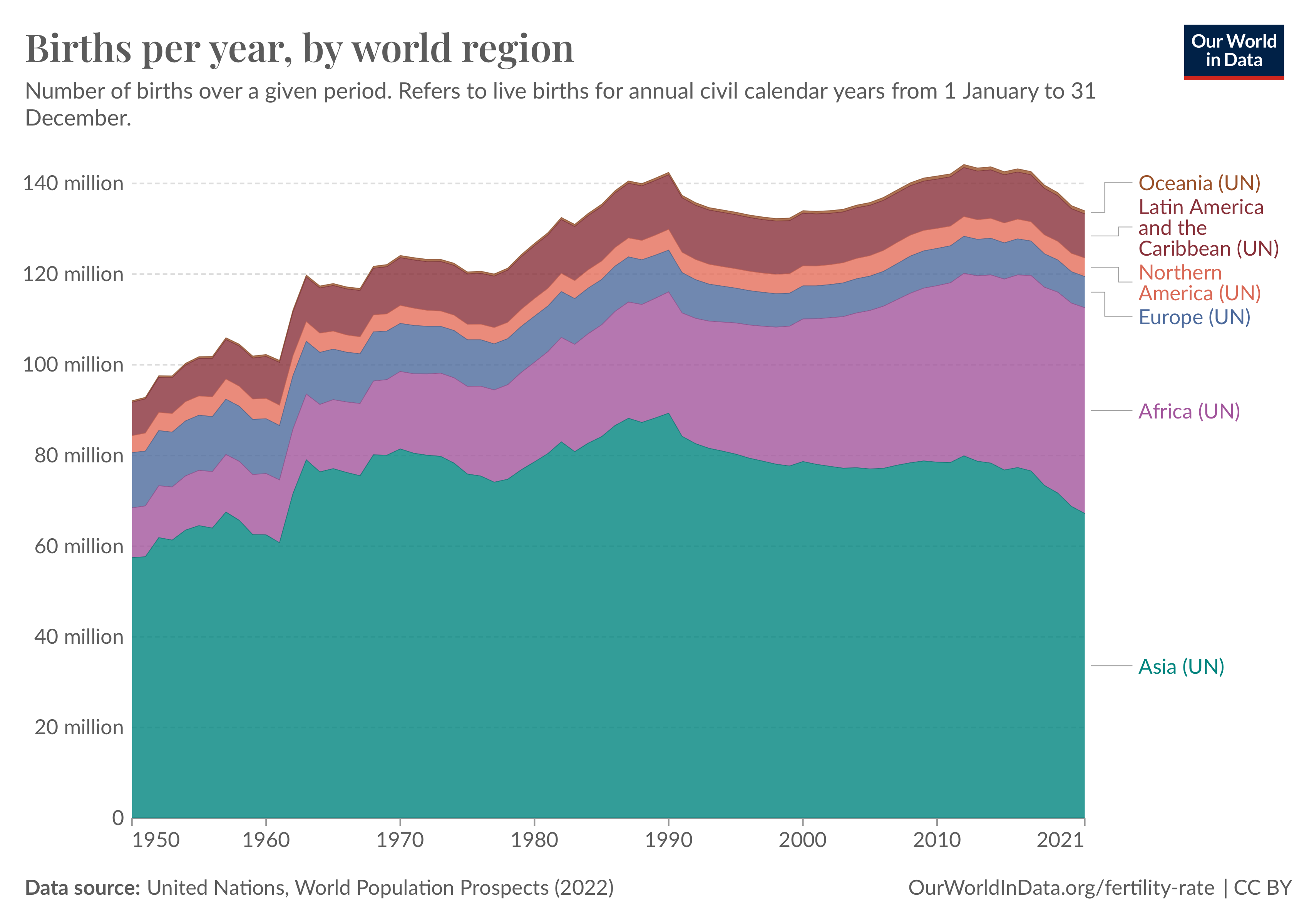If climate-based disasters, including their chain reactions (drought -> famine; sea level rises -> migration -> disease; etc.), cause a 10% reduction ("decimation") of humans by the close date this resolves YES. Otherwise NO after close.
10% reduction might mean any one or mix of factors:
outright deaths
decrease in fertility causing population decline w/in timeframe
reduction in population replacement curves, over the global average
etc.
Our baseline for decrease in population not due to extraordinary deaths will be framed around the 2022 UN Projections (currently located here). This is not the defining point of truth if solid analysis and data comes to light, especially considering that the UN already takes some climate trends into account, but it's a great indicator of unexpected change, such as if life expectancy, fertility, or replacement rates drop precipitously in later versions of their projections. See also the OWID data linked in this comment.
Some 2050 numbers from the 2022 projections:
9.7 billion humans
16.4% aged 65+
Fertility (births per woman): 2.1
Life expectancy: 77.2; 74.8 (M), 79.8 (F)
---
2050 (this): /Stralor/will-climate-change-decimate-humans
2070: /Stralor/will-climate-change-decimate-humans-9f63de4b27a2
2090: /Stralor/will-climate-change-decimate-humans-a6501c666cd9
How would this resolve if e.g. superintelligent AI boils the oceans?
@adele I'd have to hear a very convincing argument that a specific intentional action like that is "climate change" when it happened. instinct says that's an easy NO
@Stralor To be clear, I'm not imagining boiling the ocean as the explicit goal of the ASI, but as a side-effect of massive amounts of power generation.
“The number of heatstroke victims hit record numbers in 2022 as global warming continues. In heat-induced injuries, circulatory shock is the most severe and deadly complication. This review aims to examine the mechanisms and potential approaches to heat-induced shock and the life-threatening complications of heatstroke.”
https://link.springer.com/article/10.1007/s00011-022-01687-8
@StephanHeijl "Both heat and cold can kill. But cold is far more deadly. For every death linked to heat, nine are tied to cold."
If climate change causes a lot of economic damage, then it might actually lead to increases in the human population, because countries getting richer generally leads to them having a lower birth rate and population growth rate (excluding immigration). I’m unsure if countries that become poorer, as might happen with devastating climate change, will increase their birth rate; it would probably take time, as it involves cultural changes. Climate change has, I think, slowed down the growth of some countries, which would lead to increased births relative to the counterfactual.
It might be that in rich countries that get poorer, people have fewer children, since they don’t have the money to raise them in sufficient comfort and have access to contraceptives. I don’t think that’s enough to decimate humanity when it’s countered by poor countries having less reduction in their birth rate.
The upshot here is that I think it’s unlikely climate change will decimate humans through decreased births from severe economic damage. It could by increasing deaths through economic damage, extreme weather, or maybe wars.
@Trifalcon I think hunger, extreme weather, loss of habitat and wars / border conflict caused by migration might well happen within the next 25 years. And I think it’s more than 10% likely it can decimate humanity, although I agree it’s an awful lot of people. Something like 800 million people?
@JaimeSantaCruz https://www.science.org/doi/10.1126/sciadv.1400253
“Accelerated modern human–induced species losses: Entering the sixth mass extinction”
2015
@NiklasBergstrom Yes, I absolutely agree with you, I was answering a previous comment that suggested we were still growing.
@RobertCousineau an answer I gave to another question:
how do we ever do these things? If there's not associative data, this cannot resolve YES, but I expect plenty of scientists will go "these events resulted in this loss of human potential", just as we saw with COVID impact analyses
I would say "multivariate and messy" would prob include climate but doesn't wholly equal climate. Likely resolve NO.
I will be dead before I get payed for this, but has Manifold not been paying attention? 2.1 fertility rate is .2 below replacement rate.
Also:

https://news.stanford.edu/2023/09/18/human-driven-mass-extinction-eliminating-entire-genera/
https://www.nature.com/articles/nature09678 - “Our results confirm that current extinction rates are higher than would be expected from the fossil record, highlighting the need for effective conservation measures.”
Nature volume 471, pages 51–57 (2011)
@JaimeSantaCruz Might be a projection from this:
“As health has improved and the mortality in the population has declined, we’ve typically seen accelerated population growth. But the global average fertility rate has halved from around 5 in the 1960s to around 2.4 in 2021. Rapid population growth then comes to an end as the fertility rate declines.”
